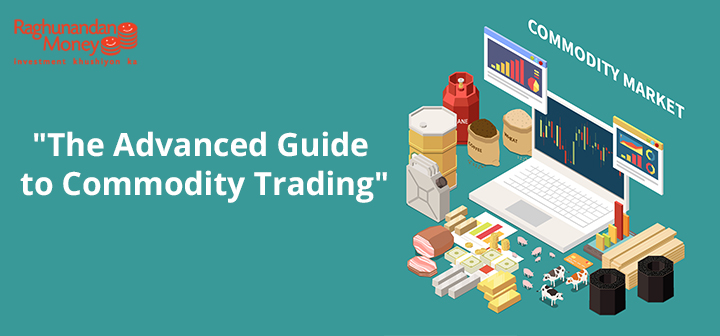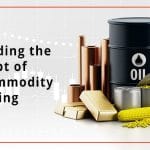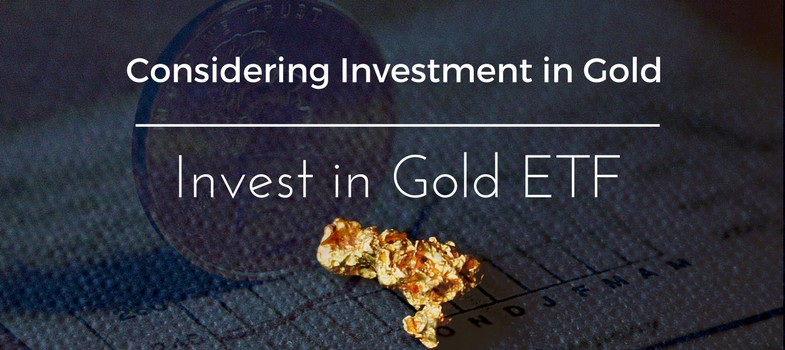Published : May 6, 2020

Commodity trading has been popular in India for very long time. The cotton trade association started doing organized futures trading in 1875. It has been through many evolutions since then from spot market to derivative market. There are two ways to do commodity trading in India as over the counter and through the stock exchange. However, we will be discussing about the trading done through stock exchange which is done electronically. Electronic trading has been vastly popular in the country which is majorly done by two national exchanges Multi Commodity Exchange (MCX) and National Commodity and Derivative Exchange (NCDEX). There is wide range of products available in the market like metals, energies, bullions, and agricultural commodities, where MCX focuses on metals, energy, and bullions while NCDEX takes care of agricultural commodity trading. The stock exchanges launch derivative products. These derivatives are products whose value is derived from the underlying commodity. Futures, forwards, and options are form of derivatives. There are several participants in commodity trading in India like hedgers, speculators, traders, producers, and industrial end-users.
Regulator of Commodity Trading Market in India:
The Securities and Exchange Board of India (SEBI) regulates the commodity trading in India. The main objective of SEBI is to protect the interest of retail traders and regulate the activities of all market participants. The SEBI ensures that the trading has been done fairly and not manipulated by large investors.
Mechanism of Commodity Trading in India:
If any trader wants to take part in the commodity trading in India, he must have a trading account with the brokers. A broker is a firm or an individual through which one can buy or sell various commodities available in the market. After opening the trading account, you can ask your broker to buy or sell commodities in your account. The buy or sell request order is then sent to the exchange (MCX or NCDEX) by your broker. The exchange then matches the best buy order with the best sell order available on the platform. The trades happen in lot sizes for example if you want to buy a MCX silver future then the minimum lot size is 1 KG, meaning you have to buy one kilogram of silver to take part in the trading. The lot sizes of each commodity are different.
Role of Warehousing in Commodity Trading in India:
NCDEX or the MCX are not directly involved in the delivery of commodities however, they facilitate the entire warehousing system like standardization, additional margins, and certification, etc. Delivery of commodity requires the submission of a warehouse receipt or warrant showing a certain quantity and defined quality of a commodity in a specific location.
Clearing and Settlement of Commodity Contracts:
National Commodity Clearing Limited (NCCL) and Multi Commodity Exchange Clearing Corporation (MCX CCL) acts as Clearing Corporation for NCDEX and commodity trading respectively. The exchanges provide both facilities either cash settlement or delivery of the commodity. If one wishes to settle the trades through cash then he has to indicate at the time of placing the order that he has no intention of taking the delivery. However, you can switch the option to cash settle or taking delivery till the expiry of the contract. For example, if you have bought the silver future contract on a delivery basis, however, the price has reached very high and you wish to settle the contract in cash then the difference profit will be given to you.
Why you should love Commodity Trading:
There are many reasons to do commodity trading in India through exchanges. Suppose, you feel that the price of gold will rise drastically in future and you want to make a profit of that ride. However, you are worried about the purity of gold and the storage of gold if purchased from the spot market. Here, on the stock exchange, both the facilities are available whether you take delivery or want the profit made money. Moreover, trading in the commodity market in India happens on a margin basis, which means you don’t have to pay full payment to buy the contract. However, if you wish to take the delivery then you have to have money in the account equivalent to the value of the contract bought.
Conclusion:
Commodity trading in India has been one of the top volume generators as compared to many countries. Commodities contract are cheaper to buy as the margin on the contracts is very low as compared to stock futures. The commission charged by brokers is also lower compared to stock futures. The volatility in the commodity market is also very high which gives the trader an opportunity to make even more money. You can also take part in the highly secure and organized market available in India as there is always counterparty risk while trading via physical market.

Enjoy flexible trading limits at
lowest brokerage rates ?
Open Your Investments Account Now
0Account Opening Charges
Life Time Demat AMC
Brokerage







Ensure the security of your investments by updating your nominee details in your trading & demat account online. It’s quick and hassle-free!
📌 Act Now to Stay Compliant
For assistance, contact our Customer Care at 0562‑4266666 and email askus@rmoneyindia.com.

IT'S TIME TO HAVE SOME FUN!
Your family deserves this time more than we do.
Share happiness with your family today & come back soon. We will be right here.
Investment to ek bahana hai,
humein to khushiyon ko badhana hai.
E-mail
askus@rmoneyindia.com
Customer Care
+91-9568654321